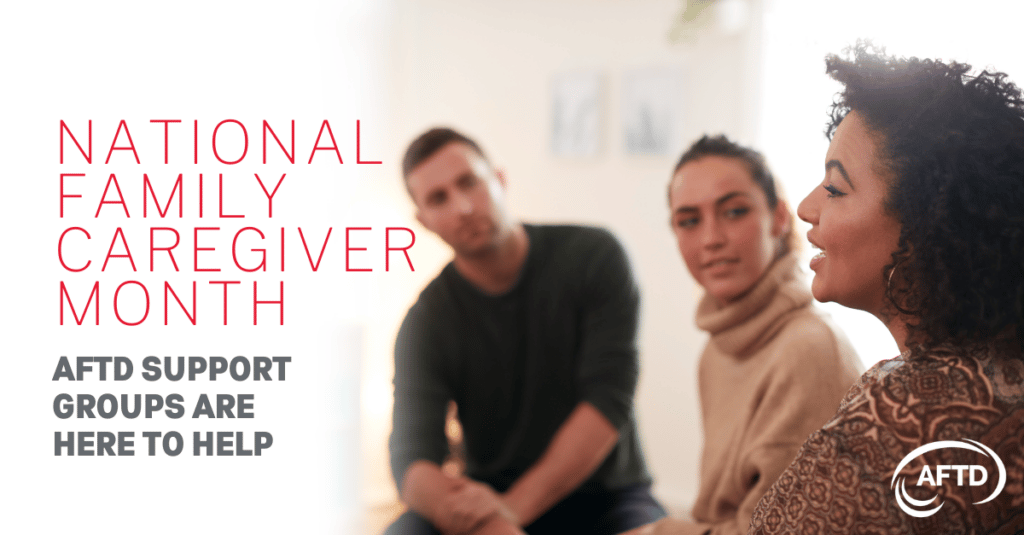National Family Caregiver Month: AFTD Support Groups are Here to Help

The FTD journey can be an isolating experience for people with a diagnosis and care partners alike.
However, you don’t have to make the journey alone; there are many former and current care partners as well as persons diagnosed who want to lend support to others as they navigate FTD.
AFTD reached out to support group volunteer Marian Grems, who shared her personal experiences and insights on support groups to help illustrate how helpful they can be. Marian’s FTD journey has lasted two decades; she has been a care partner for her husband, son, and now her daughter.
When asked why she became a support group volunteer, Marian said that she wanted to find ways to give back and connect. She wanted to pay forward the care and support she received during her journey.
“I realized how important it was after my husband was diagnosed,” Marian said. “Out of the blue one day, a woman called me asking for support; her husband had FTD, and her neurologist had given her my number. She helped guide me in the early times, and I hoped that I could do that for other people — to listen and be there.”
As a support group leader, Marian has not only been able to support others, she has also been able to facilitate the connections and new friendships forged between her group members. Thanks to Zoom, Marian says that group members are able to meet with ease, and not have to worry about finding another care partner to relieve them while they attend meeting.
Not all connections between group members are online though: half of Marian’s group members connect offline. Marian takes the time to check in with members outside of meetings as well, telling AFTD, “I try almost every other month or so to privately communicate with group members via email to see how they’re doing.”
When asked about the impact the support group has had on members, Marian said that she has noticed many positive changes over the years.
“It’s been amazing,” Marian said. “For me, that’s the joy; the confidence, the support, the leaning on each other, their honesty — not only their honesty in sharing their stories, but their honesty in giving feedback on important topics like power of attorney or finances. It’s encouraging to see them lift each other up and build each other’s confidence.”
The group has been such a positive experience that some members have begun to ask if they can meet more than once a month. Marian says two of her members are even training to become support group volunteers themselves.
While some people take wholeheartedly to joining support groups, others may be more reluctant. It can be hard to take the first steps to make oneself vulnerable after experiencing the difficulties that can arise during the FTD journey. Marian helps address this by personally guiding new group members.
“I usually try to have a conversation prior to a meeting.” Marian said. “I try to do it in a couple of stages: we have an initial conversation after they’ve reached out through the AFTD HelpLine or have seen it online. I encourage an email or in-person conversation, then I usually follow up, sending them a meeting notice and a little welcome from the group. I also have a little slide presentation that I send to them about the group, confidentiality, containing information and resources.”
For anyone on the fence about joining a group, Marian said, “I was resistant myself during my husband’s journey. But I strongly encourage people to give it a try. It’s the gift that keeps on giving, and there is no harm in trying a group!”
Marian also invites anyone who is curious to become a support group volunteer. Facilitating a support group is an engaging and rewarding experience that can help make a significant, positive impact in your community.
If you would like to learn more about the support group experience, you can watch the What I’ve Learned by Supporting Others panel from the 2022 AFTD Education Conference, featuring Marian and fellow support group volunteer Scott Rose.
To search for a support group, navigate to the Find Support Near You section of AFTD’s website and select your state from the drop-down menu. The AFTD HelpLine can also help you find a support group, as well as answer any questions you might have about managing FTD; contact the HelpLine at 1-866-507-7222 or info@theaftd.org.
Are you interested in hosting your own support group to help others on their FTD journey? Head to the Take Action and Volunteer page to fill out a volunteer form; you can also call AFTD at (267) 514-7221 and ask to speak with a volunteer coordinator
By Category
Our Newsletters
Stay Informed
Sign up now and stay on top of the latest with our newsletter, event alerts, and more…
